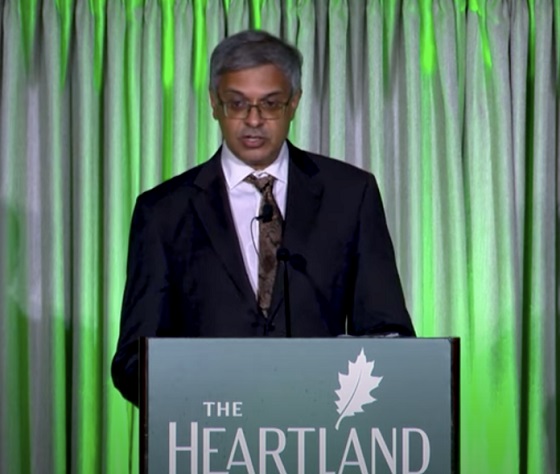Censorship Industrial Complex
‘Silicon Curtain’ Is Protecting Government Censorship

From Heartland Daily News
By AnneMarie Schieber
Citing Winston Churchill’s “Iron Curtain” metaphor describing the Cold War division of Europe, health care policy expert Dr. Jay Bhattacharya told an audience, “We are now in the middle of a Silicon Curtain of censorship descending across the previously free West.”
In a keynote address at The Heartland Institute’s Benefit Dinner in Chicago on September 13, Bhattacharya said public health is the new “fig leaf” for justifying government censorship.
“Free speech is in dire danger in the U.S.,” said Bhattacharya. “The government will use its power to suppress criticism [of] its own misinformation.”
Bhattacharya is a plaintiff in Murthy v. Missouri, in which the Supreme Court lifted a preliminary injunction directing the Biden administration not to “coerce or significantly encourage social-media companies to suppress protected speech” and remanded the case to a lower court.
“This gives a way to the government to censor at will,” said Bhattacharya. “All they have to do is send emails and algorithms to social media companies without naming a single person—just name ideas not allowed to be said online.
“The First Amendment, in effect, is an unenforceable dead letter,” said Bhattacharya.
Under Fire for Opinions
Bhattacharya, a medical doctor and professor of medicine, economics, and health care research policy at Stanford University, rose to prominence when he published The Great Barrington Declaration (GBD) on October 4, 2020, with epidemiologists Martin Kulldorff and Sunetra Gupta. The declaration criticized COVID lockdowns and urged authorities to focus on keeping children in school and protecting the elderly instead of imposing broad-based restrictions.
Although the writers were highly recognized for their work and associated with Stanford, Harvard, and Oxford Universities, respectively, powerful government figures denounced them. Francis Collins, then director of the National Institutes of Health, and Anthony Fauci, then director of the National Institute of Allergy and Infectious Diseases, called the trio “fringe epidemiologists” in emails that were made public later.
Ostracized and Blacklisted
Bhattacharya was ostracized by other professors at Stanford and was blacklisted on Twitter. When Elon Musk purchased the social media giant, he discovered the list and shared it with Bhattacharya.
Google “de-boosted” the GBD, which was posted online and signed by more than 940,000 doctors, researchers, and concerned citizens. Facebook banned posting of it altogether.
Using internal government emails they obtained, the plaintiffs showed the government was controlling social media companies by threatening to regulate them out of business if they didn’t abide by the Biden administration’s censorship demands.
The White House also used universities to help with the censorship work, which the government is prohibited from doing directly. Bhattacharya brought up the case of the Stanford Internet Observatory, which received government grants to develop algorithms to target a particular idea. The government shared that information with social media platforms.
Rising Worldwide
Europe, Canada, the U.K., and Australia have led the way on legislation to control speech, Bhattacharya told the audience. The bills and laws ostensibly outlaw violence, pornography, and hate on the internet, carry Orwellian names, and establish authorities to do the enforcement.
These include the Digital Services Act in the E.U., the Online Harms Act in Canada, and the Online Safety Act of 2023 in the U.K. A bill in France establishes a digital “safety” commission for the same purpose.
“It is dangerous to let governments have control over the definition of hate,” said Bhattacharya. “It’s even more dangerous to allow government to determine what is misinformation because science and medicine depend on free speech to operate properly.”
Censoring Political Opponents
Scott Jensen, a medical doctor and Minnesota state senator who ran against Tim Walz for governor in 2022, says his respect for Bhattacharya is immense. Jensen was a prominent critic of COVID-19 policies, and Facebook censored his election page. Jensen lost the race, and Walz went on to implement some of the most draconian COVID-19 restrictions and is Vice President Kamala Harris’s running mate in this year’s election for president.
“Dr. Bhattacharya’s willingness to present and stand by a contrarian narrative—which ultimately proved to be profoundly wise—will go down in history as an act of immense courage in the face of smothering government censorship fueled by behemoth, profit-driven technological companies,” said Jensen.
“American’s First Amendment rights are under attack by a political elite, but Dr. Jay Bhattacharya continues to stand in the breach and do whatever is necessary to protect and defend free speech,” said Jensen.
AnneMarie Schieber ([email protected]) is the managing editor of Health Care News.
Censorship Industrial Complex
Justice Centre campaigning Canadian provinces to follow Alberta’s lead protecting professionals

Justice Centre launches national campaign to stop ideological overreach in regulated professions
The Justice Centre for Constitutional Freedoms announces the launch of a national campaign urging all provinces to adopt legislation that restores professional regulators to their proper role of overseeing competence and ethics, rather than compelling speech or imposing political ideology on regulated professionals who serve the public.
Across Canada, professionals such as doctors, nurses, teachers, social workers, engineers, dentists, lawyers and many others are governed by regulatory bodies created to uphold technical competence and ethical standards. Instead of focusing on those core responsibilities, however, many regulators have begun embedding political or ideological content into mandatory courses, codes of ethics and continuing education requirements.
At the same time, professionals are increasingly being investigated or disciplined not for misconduct, but for expressing personal views or declining to endorse political positions.
To help Canadians take action, the Justice Centre has created an online tool with a ready-to-send letter that goes directly to the provincial representatives responsible for the relevant legislation. All the user needs to do is select their province and enter their information, and the tool automatically delivers the letter to the appropriate recipient.
The prepared letter outlines three essential legislative amendments:
- prohibiting regulatory bodies from pursuing political objectives;
- prohibiting regulators from monitoring or controlling the speech of their members; and
- prohibiting regulators from embedding political or ideological content into definitions of competence and ethics.
Alberta is the first province to take meaningful steps toward addressing this growing problem. Its proposed legislation, called the Regulated Professions Amendment Act, is designed to prevent regulators from compelling speech, advancing political objectives or embedding ideology into definitions of competence and ethics.
The Justice Centre encourages all Canadians to visit our website today to take action and help protect the independence of regulated professionals.
Censorship Industrial Complex
Conservative MP Leslyn Lewis slams Liberal plan targeting religious exemption in hate speech bil

From LifeSiteNews
Bill C-9 is being called an attempt to criminalize sections of the Bible, Quran, Torah, and other sacred texts in Canada.
Canadian Conservative MP Leslyn Lewis blasted a federal government plan to criminalize parts of the Bible as an attack on “Christians,” warning it sets a “dangerous precedent” for Canadian society.
“The Liberal government has agreed to remove the religious exemption in their hate speech bill, C-9, to secure Bloc support and push this bill through Parliament,” Lewis wrote Tuesday on X.
“This is not a minor adjustment. This shift comes at the direct expense of Christians and other religious communities across Canada.”
As reported by LifeSiteNews, a government insider revealed that the Liberal government of Prime Minister Mark Carney plans to remove religious exemptions from Canada’s hate-speech laws by modifying a bill.
Bill C-9, the Combating Hate Act, as reported by LifeSiteNews, has been blasted by constitutional experts as allowing empowered police and the government to go after those it deems have violated a person’s “feelings” in a “hateful” way.
A recent media report states that the Carney Liberals and the separatist Bloc Québécois want to amend Bill C-9, which would “criminalize sections of the Bible, Quran, Torah, and other sacred texts,” Conservative leader Pierre Poilievre noted yesterday on X.
Lewis warned that “no government” should “ever negotiate away religious liberty in exchange for political support.”
“No party should decide which beliefs are acceptable and which ones carry criminal risk,” she warned.
She added that the Liberal government of Carney’s plan to amend Bill C-9 is a “dangerous precedent.”
“Religious freedom is not a political tool. It is a Charter right, a constitutional protection, and a cornerstone of our society,” she warned.
Poilievre blasted the Liberals’ plan as well, warning Liberal-Bloc amendments to C-9 will “criminalize sections of the Bible, Quran, Torah, and other sacred texts.”
“Conservatives will oppose this latest Liberal assault on freedom of expression and religion,” he noted on X earlier this week.
In response, the party launched a petition over fear that religious texts could be criminalized.
Liberal MP Marc Miller had said earlier in the year that certain passages of the Bible are “hateful” because of what it says about homosexuality and those who recite the passages should be jailed. As reported by LifeSiteNews, he was recently appointed as a government minister by Prime Minister Mark Carney.
-

 Alberta1 day ago
Alberta1 day agoAlberta Sports Hall of Fame Announces Class of 2026 Inductees
-

 Business21 hours ago
Business21 hours agoCanada’s climate agenda hit business hard but barely cut emissions
-

 Great Reset2 days ago
Great Reset2 days agoCanada’s MAiD (State Sanctioned Murder) Report Just Dropped
-

 Business2 days ago
Business2 days agoNew Chevy ad celebrates marriage, raising children
-

 Automotive2 days ago
Automotive2 days agoPower Struggle: Governments start quietly backing away from EV mandates
-

 MAiD1 day ago
MAiD1 day agoFrom Exception to Routine. Why Canada’s State-Assisted Suicide Regime Demands a Human-Rights Review
-

 Alberta2 days ago
Alberta2 days agoThis new Canada–Alberta pipeline agreement will cost you more than you think
-

 Energy2 days ago
Energy2 days agoUnceded is uncertain









